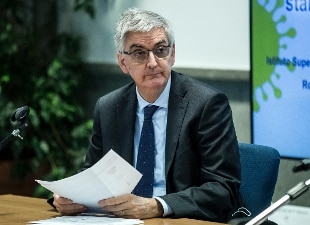- Chrysants: less serious cases thanks to masks
- Phase 2, new Arcuri-Federfarma agreement for mask supplies
- Coronavirus, Brusaferro (Iss): cases in decline in all regions including Lombardy but at three speeds
- Iss, Brusaferro: first phase 2 impact will be known in a week. The curve decreases
Share
04 June 2020Surgical masks are "effective two, maximum six hours, but to date there are no tools and methodologies that guarantee their reuse with the same performance". For "those of the community it can be reasoned on the basis of the type of material used", but in general for the "surgical" mask to date there is no evidence of their possible reuse, for those of the community instead in relation to the type of material it can be evaluated "their eventual reuse. The president of the Higher Institute of Health (ISS), Silvio Brusaferro, said it in a hearing at the Commission of Inquiry into the illegal activities related to the waste cycle and related environmental offenses, the 'Ecomafie', on waste management linked to the Covid-19 emergency.Surgical masks are "an internationally standardized instrument with certain requirements", and have "filtering characteristics and resistance to particular splashes, UNI norms, which must be respected", explains Brusaferro, reiterating that surgical masks have "particular performances and are made with special material ". Instead, for "those of communities you can reason" on their eventual reuse, "based on the type of material used - explains the ISS president - they do not have particular characteristics and filtering standards, but are basically barrier tools that can be used in Community context ", and" according to the material it is possibly reusable ".
Stressing that the "Ffp2 and Ffp3 are not mentioned" masks, "surgical masks cannot have less stringent standards", Brusaferro specifies, while those of "communities may have less stringent requirements". Meanwhile, however, at the research and production level we are studying reusable materials for the masks, and the "theme must be promoted to reduce the load, the quantity of material that generates waste - concludes the ISS president - but it must be done with a 'attention that includes the use of recyclable materials first and materials that can be reconditioned ".
"There is no transmission of the virus from food"
"Without prejudice to the absence of evidence regarding the food transmission of the virus and the WHO's assessment that the possibility of contracting Covid-19 through food or through food packaging it is highly unlikely, during the Sars CoV-2 epidemic, the protection of food hygiene requires limiting, as far as possible, the risk introduced by the presence of potentially infected subjects in environments intended for the production and marketing of food " explained Brusaferro.
"In the laboratory virus lives 7 days on a mask"
How long does the SarsCov2 virus live on a used mask? "Up to seven days", but in laboratory conditions, protected, not in reality. Rosa Draisci, of the National Center of Chemicals of the Higher Institute of Health (ISS), says it in a hearing to the Commission of Inquiry on illegal activities related to the waste cycle and related environmental offenses, the 'Ecomafie', on waste management linked to the Covid-19 emergency. Draisci explains that "in laboratory studies, not in reality, in the internal part of the mask parts of virus are detected after 7 days from inoculation, but - he underlines - it is an experimental activity done in the laboratory, with the deposition on the solution template containing the virus. " In these "protected" conditions the virus lives "up to 7 days", the expert reiterates, and "we only have this data", there are no other studies. In the 'real world' the virus lives less, adds the ISS president Silvio Brusaferro, the laboratory ones are "very protected contexts, cannot be immediately assimilated" to normal, "is a situation protected from light, from the Sun and from other factors that influence the survival of the virus. "

